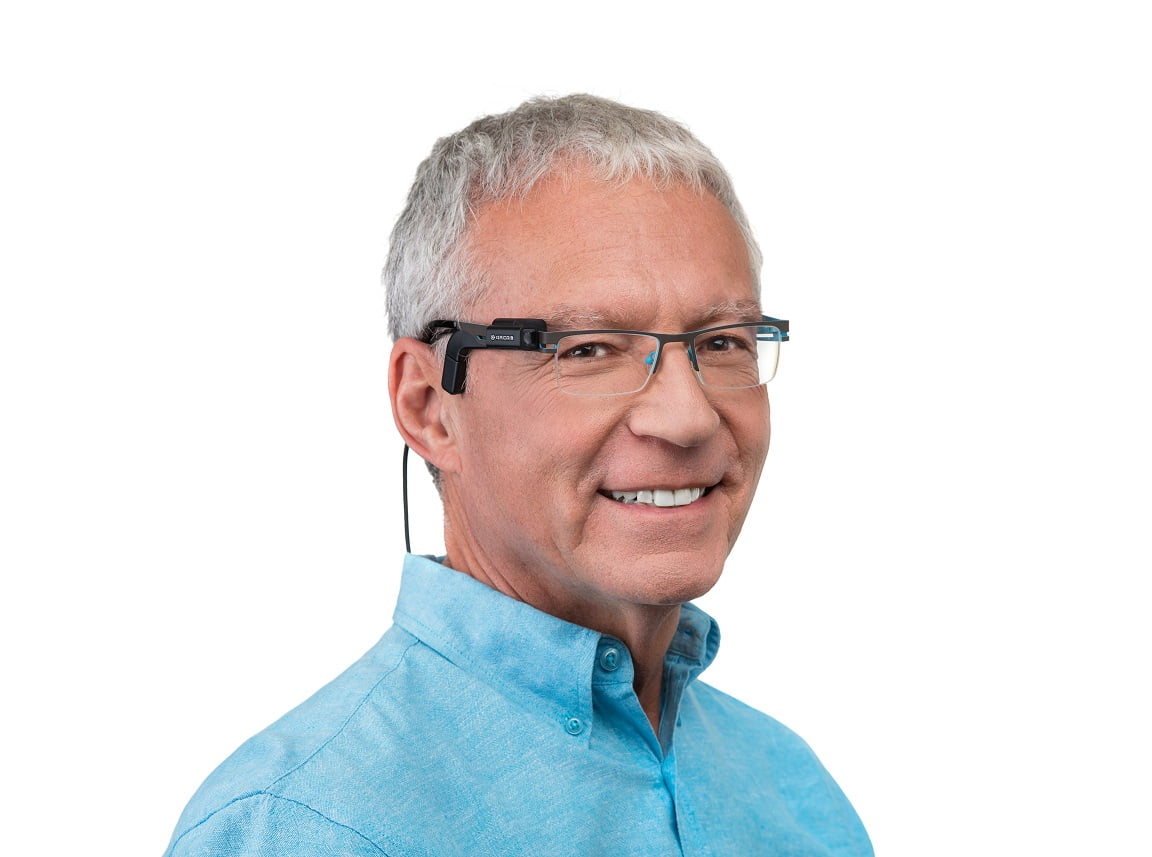Many in the Startup Nation associate the names of Prof. Amon Shashua and Ziv Aviram with Mobileye, the insanely successful Israeli startup acquired by Intel for $15.3 billion. But what most don’t know, is that the same winning team is also behind a seemingly modest wearable device that aims to revolutionize the lives of the blind and visually impaired.
With their startup OrCam, they have developed a finger-sized, battery-powered device called MyEye that attaches to the side of a user’s glasses. Using optical character reading technology and artificial vision software, MyEye reads printed text from newspapers, restaurant menus, books, product labels, money notes, and mobile text to its user. The user only has to point to a piece of text to activate the device. MyEye immediately takes a picture and reads out the information.
OrCam is developing “revolutionary wearable devices in order to empower people,” Dr. Yonatan Wexler, OrCam’s executive vice president of research and development, tells NoCamels.
MyEye can also recognize faces, allowing its users to know who they are addressing. For this, the user has to “look” in the direction of a person, state their name while holding a base unit and MyEye then “saves” the person in its contacts. From that point forward, when the OrCam user looks at that person, the device will state his or her name.
“We offer the visually impaired the ability to do things that they couldn’t do without MyEye, and in a way that is as natural as can be,” Wexler says.
SEE ALSO: Israel’s Project RAY Creates Advanced Smartphone And Apps For The Blind
The $4,226 device consists of a head unit, a base unit, and a charger. The head unit has a smart camera and a speaker which attaches to the glasses. The volume of the speaker can be adjusted so only the user can hear it. The base unit contains the battery. OrCam has thousands of users in 15 countries and it can read ten languages. However, the reliability of the device is limited when the text is either handwritten or printed in an unusual font.
According to OrCam, Israelis who are registered as legally blind can receive a government subsidy of $1,400. Despite its steep price, MyEye’s updates are automatic and free, and users also receive a personalized training session by an OrCam trainer who instructs how to best incorporate the device in daily life. Additionally, the company offers phone and email support, along with online tools to assist their customers.
SEE ALSO: Behind Israel’s Largest Exit: Why Intel Acquired Mobileye For $15.3 Billion
Sign up for our free weekly newsletter
SubscribeAccording to Wexler, there are competing assisted devices, where one must “strap on this whole apparatus to your face that gets hot and makes you dizzy. With OrCam, it’s so unobtrusive and so versatile and convenient.”
He adds: “People tell us that ‘if it’s going to look ridiculous, I’m not going to wear it. I’m already disadvantaged. I’m not going to also look like a fool.'”
The future is in sight
In the coming months, OrCam will be releasing version 8 of MyEye in a software update. This update will feature numerous new functions, including: scanning barcodes to help users perform tasks like grocery shopping; automatic page detection, so users will almost instantly receive information; physical descriptions of people such as age and gender to improve socialization; and color identification.
Additionally, a device tentatively named MyMe will be commercialized later this year. MyMe is a thumb drive-sized device that clips onto the user’s shirt and only performs facial recognition. With this device, users will no longer have to worry about being bad with names or forgetting faces; the device will take care of that. As such, the market for MyMe will be broader than MyEye because even those with perfect vision can suffer from poor memory.
The successful Mobileye duo behind OrCam
OrCam was founded by Shashua of the Hebrew University and Aviram in 2010, and has since raised $56 million from Intel Capital. Despite their remarkable success at autonomous car tech company Mobileye and its sale to Intel, the two do not rest on their laurels. They are continuing to change the world and transform lives with OrCam. Their proven track record undoubtedly bodes well for OrCam’s future.
Related posts

Editors’ & Readers’ Choice: 10 Favorite NoCamels Articles

Forward Facing: What Does The Future Hold For Israeli High-Tech?

Impact Innovation: Israeli Startups That Could Shape Our Future






Facebook comments